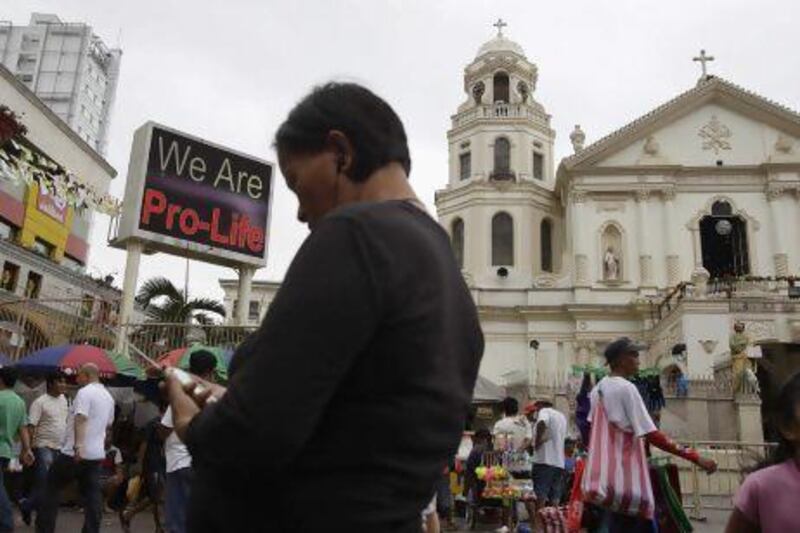MANILA // Twenty-six years after leaders of the Roman Catholic church helped his mother to marshal millions of Filipinos in an uprising that ousted a dictator, president Benigno Aquino III picked a fight with the church over contraceptives and won a victory that bared the bishops' worst nightmare: They no longer sway the masses.
Mr Aquino last month signed the Responsible Parenthood and Reproductive Health Act of 2012 quietly and without the customary handshakes and photographs, to avoid controversy. The law that provides state funding for contraceptives for the poor pitted the dominant Catholic church in an epic battle against Mr Aquino and his followers.
A couple with links to the church filed a motion on Wednesday to stop implementation of the law, and more petitions are expected. Still, there is no denying that Mr Aquino's approval of the legislation has chipped away at the clout the church has held over Filipinos, and marked the passing of an era in which it was taboo to defy the church and priests.
Catholic leaders consider the law an attack on the church's core values - the sanctity of life - saying that contraceptives promote promiscuity and destroy life. Mr Aquino and his allies see the legislation as a way to address how the poor - roughly a third of the country's 94 million people - manage the number of children they have and provide for them. Nearly half of all pregnancies in the Philippines are unwanted, according to the United Nations Population Fund, and a third of those end up aborted in a country where abortion remains illegal.
Rampant poverty, crowded slums and rising homelessness and crime are main concerns that neither the church nor Mr Aquino's predecessors have successfully tackled.
"If the church can provide milk, diapers and rice, then go ahead, let's make more babies," said Giselle Labadan, a 30-year-old roadside vendor. "But there are just too many people now, too many homeless people, and the church doesn't help to feed them."
Ms Labadan said she grew up in a God-fearing family but has defied the church's position against contraceptives for more than a decade because her five children, age 2 to 12, were already far too many for her meagre income. Her husband, a former soldier, is jobless.
She said that even though she has used most types of contraceptives, she still considers herself among the faithful. "I still go to church and pray. It's a part of my life," Ms Labadan said.
"I have prayed before not to have another child, but the condom worked better," she said.
Over the decades, the moral and political authority of the church in the Philippines is perceived to have waned with the passing of one its icons, Cardinal Jaime Sin in 2005. He shaped the role of the church during the country's darkest hours after the dictator Ferdinand Marcos imposed martial law- starting in 1972 by championing the cause of civil advocacy, human rights and freedoms. Sin's action mirrored that of his strong backer, Pope John Paul II.
Three years after Mr Aquino's father, Benigno Aquino Sr - a senator who opposed Marcos - was gunned down on the Manila airport tarmac in 1983, Sin persuaded Aquino's widow, Corazon, to run for president. When massive election cheating by Marcos was exposed, Sin went on Catholic-run Radio Veritas in February 1986 to summon millions of people to support military defectors and the Aquino-led opposition. Marcos fled and Aquino, a deeply religious woman, was sworn in as president.
Democracy was restored, but the country remained chaotic and mired in nearly a dozen coup attempts. After Aquino stepped down in 1992, the country elected its first and only Protestant president, Fidel Ramos. He, too, opposed the church on contraceptives and released state funds for family-planning methods.
Catholic bishops campaigned hard against Mr Ramos's successor, the popular film actor Joseph Estrada, a hero of the impoverished masses who made little attempt to suppress his reputation for womanising, drinking and gambling.
But few heeded the church's advice. Mr Estrada was elected with the largest victory margin in Philippine history. Halfway through his six-year presidency, in January 2001, he was confronted with another "people power" revolt - backed by political opponents and the military - and was forced to resign.
His successor, Gloria Macapagal Arroyo, styled herself as a devout Catholic and sought to placate the church by abolishing the death penalty and delaying the contraceptives law, which languished in congress during her nine years in power.
It mattered little. Ms Arroyo's mismanagement and corruption scandals set the stage for Mr Aquino's election on a promise to rid the Philippines of graft, fix the economy and lift millions out of poverty. The scion of the country's democracy icon took power several years after Sin's death, but it was a different era in which the church was battered by scandals of sexual misconduct of its priests.
The latest defeat of the church "can further weaken its moral authority at a time when this is most badly needed in many areas, including defence of a whole range of family values", said the Reverend John J Carroll, founding chairman of the Jesuit-run John J Carroll Institute on Church and Social Issues. He said he wondered how many Catholics had been "turned off" by incessant sermons and prayers led by the church against the contraceptives law, and how much it contributed to rising anticlericalism and the erosion of church authority.
"People today are more practical," Ms Labadan said. "In the old days, people feared that if you defied the church, it would be the end of the world."





